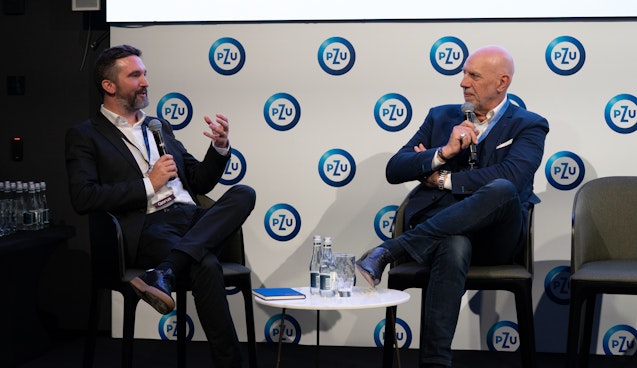
From Legacy to Leadership: Cloud as the Gateway to Enterprise AI
Following on from my colleague Simon Ruelens' insightful discussion at the Qorus Reinvent Forum in Warsaw, where he highlighted the transformative power of AI in insurance, I'm compelled to delve deeper into a critical enabler of this revolution: cloud-enabled modernisation. As AI rapidly moves from experimentation to becoming a core driver of business transformation, it's clear that our platform choices are paramount in determining our evolving AI capabilities.
Cloud modernization enabling Enterprise AI Adoption in the Insurance Industry
In the dynamic landscape of the insurance sector, the potential of Artificial Intelligence, especially Generative AI (GenAI), Large Language Models (LLMs), and Agentic AI, is undeniable. These advanced AI forms offer unprecedented levels of reasoning, judgment, creativity, and empathy, with the potential to revolutionise everything from sales productivity and underwriting accuracy to augmented claims management and customer service.
Customers, now accustomed to seamless digital experiences, expect higher accuracy, reliability, hyperpersonalised offers, and human-like conversations from their service providers. Insurance is no different. However, for large established insurers, a significant hurdle persists: the persistence of legacy IT platforms, coupled with siloe'd data environments and a heavy compliance burden, creates substantial barriers to adopting new technologies at scale. Indeed, a recent McKinsey report revealed that nearly 80% of insurance executives feel unprepared for the digital transformation needed to compete and/or partner with cloud native agile insurtechs. This situation underscores NTT DATA's perspective. Namely, that legacy platform modernisation coupled with effective data governance and management is a prerequisite to enabling enterprise AI adoption at scale for established insurers.
To truly harness the power of AI and scale it enterprise-wide, insurers must adopt a strategic, comprehensive approach that effectively 'rewires' the enterprise.
Preparing for Enterprise AI Adoption at Scale
For insurers to move beyond fragmented solutions and pilot projects and extract lasting business value from AI, a concerted effort across several foundational areas is essential. At NTT DATA, we see three critical pillars for successful, enterprise-wide AI adoption within insurers:
Accelerate Cloud-enabled Legacy Platform modernization
A significant impediment to transformation in the insurance sector is the pervasive challenge of legacy systems and platforms, which are often undocumented, utilise outdated technology, and lack crucial vendor support. These legacy systems pose constraints on scalability, time-to-market, and interface flexibility, thereby limiting insurers' ability to efficiently leverage modern technology. For insurers to fully harness advanced capabilities, particularly Artificial Intelligence (AI) and Generative AI (GenAI), they must modernise these foundational technology platforms, which frequently lack the necessary scalability and real-time processing power for advanced AI workloads and agents.
By modernising, insurers can respond to market demands, enhance process automation, manage real-time data across various channels, and develop new products, leading to improved efficiency and customer experience. Those insurers who have fully embraced modern cloud-enabled, core platforms have seen revenues boosted by as much as 25%, significant reductions in operations costs, and have enabled up to 4x improvement in new product speed to market. As a result, Insurers are increasingly reallocating budgets from maintaining outdated legacy platforms to adopting advanced technologies like cloud computing, AI, and machine learning, driven by the need to improve top line, operational efficiency and meet the demands of digital-savvy customers.
Cloud as a Key Enabler: Migrating from legacy systems to the cloud is a strategic move that unlocks significant benefits for organisations. The cloud offers unparalleled scalability, seamless integration with modern technologies, and robust security and compliance features. GenAI as a Powerful Modernisation Tool: Encouragingly, GenAI itself can be a powerful tool in this modernisation process. It can help discover, analyse, and rewrite legacy code and generate structured documentation, thereby preserving institutional application and business process knowledge embedded in legacy platforms. Furthermore, Agentic AI can significantly enhance engineer productivity by automating code generation and testing, thereby cutting manual effort and accelerating release cycles.

NTT DATA's global technology partnerships are explicitly designed to tackle these platform modernisation challenges. Our collaboration with Google Cloud focuses on AI-driven cloud modernisation, including support for mainframe modernisation efforts. Similarly, our global business unit for Microsoft helps insurers build both cloud native and AI native applications in Microsoft Azure to boost agility and reduce complexity. We also partner with Amazon Web Services (AWS) to help insurers transform their technology platform landscapes, optimising resources and costs through AWS cloud and hybrid environments. Across all our Hyperscaler relationships at NTT Data, we leverage our insurance industry domain expertise that includes deep business process and legacy application migration capabilities to collectively support Insurers cloud cloud-enabledCloud-enabled modernisation efforts.
Accelerate Cloud enabled Legacy Platform modernization, build a Solid and Secure Data Foundation
The true power of AI, particularly Generative AI, is intrinsically linked to the quality and management of data. However, for insurers, many AI projects falter due to issues like poor data quality, inadequate risk controls, and escalating infrastructure costs. This highlights a crucial point that is true across many industries:
You can’t really start talking about AI if you’re not in the cloud, if you’re not modernizing your data, if you’re not doing all the foundational stuff.
Insurers must address scattered data environments, the quality and availability of data sources, governance gaps, and the complexities of managing sensitive information to move beyond mere experimentation to achieve lasting business value from AI. This necessitates a comprehensive data strategy, underpinned by a robust data platform layer. This critical layer demands strategic investment and is essential for making effective use of the insights available to insurers and the value from data in real-time.
A solid data foundation must address several key areas:
Data Governance: This is paramount, as AI systems rely heavily on vast amounts of data to function effectively. Ensuring this data is handled responsibly is a major challenge. Insurers must ensure that they focus on governance, encompassing compliance, ethical considerations, and risk mitigation. The governance aspect is critical because AI systems can potentially make biased decisions or misuse data if not properly managed, requiring significant investment in monitoring and regulation to align with legal and ethical guidelines. The risk of data breaches or misuse of sensitive information is a serious concern, demanding robust security measures and transparent data handling practices.
Ethical and Privacy Considerations: As stewards of customer data, insurers have always needed to prioritise privacy and ethics. The adoption of AI, particularly Agentic AI, comes with significant ethical and privacy considerations. Incorporating ethical guidelines into AI development and implementation is essential to building customer trust and ensuring responsible data use. Regulatory compliance, ethical considerations, and robust governance frameworks will significantly influence the pace and extent of Gen AI adoption across the industry.
Data curation for AI: For Generative AI to truly revolutionize the insurance value chain across Underwriting, Claims, Distribution, Operations, and deliver personalized customer service, it must be able to analyze vast amounts of data and tailor insights/actions event-driven, future-focused. For a variety of use cases. This underscores the need for data management systems that can efficiently process and prepare data for AI models, with event driven and real-time data processing. Ultimately, centralised data management systems are crucial for facilitating better decision-making and faster implementation of AI-driven solutions.
Ultimately, centralised data management systems are crucial for facilitating better decision-making and faster implementation of AI-driven solutions.

Implement a future-focused GenAI Arquitecture
GenAI adoption is not merely about new tools; it's driving fundamental changes across infrastructure, platforms, architecture, and processes. We see many AI projects stall or fail due to underlying compute and storage costs escalating, which has driven leaders to rethink their cloud strategies. For true success, the AI strategy must drive cloud and platform decisions, not the other way around. This requires adopting an AI-first approach and modernising an organisation’s entire capabilities stack. The modern AI tech stack for an insurer must be highly modular and flexible to cope with fast-changing technology. Reuse of underlying AI components and capabilities is critical for scaling AI enterprise-wide. This is where a robust GenAI architecture strategy becomes vital – anticipating how an organisation will build out its cloud and platform infrastructure to support transformative AI use cases. The strategy should consider multi- and hybrid cloud approaches for AI workloads and GPU architectures, balancing speed, cost, and sovereignty.
Flexible hybrid cloud approaches, which combine on-premises data centers with public cloud environments, should be designed to ensure scalability. The approach is beneficial when deciding where data and Large Language Models (LLMs) are stored, where inference training should happen, and how to scale across on-premise, public/private cloud, and edge compute. Insurers' regulatory compliance obligations mean that scaling AI solutions on the public cloud can be prohibitive, necessitating consideration of AI workload redistribution to dedicated AI infrastructure, such as Graphics Processing Unit (GPU) powered servers.
Insurers can leverage edge computing and high-performance computing (HPC) to meet data regulatory and availability or latency requirements. HPC compute may be a preferred option for compute-intensivehigh-speed, high-speed AI workloads that require focused high speed compute. Edge compute brings storage and compute power closer to the data sources, which can be beneficial for AI workloads that do not necessitate high latency or storage/compute.
The development of an agentic AI ecosystem is also key. The ecosystem needs to be open, composable, and vendor-agnostic, enabling multiple agents to reason, collaborate, and act (with humans in the loop as needed) across various platforms and LLMs securely and at scale.
NTT DATA's Smart AI Agent™ Ecosystem unites strategic technology partnerships, specialised assets, and an AI-ready talent engine to help clients deploy and manage responsible, business-driven AI at scale. On Google Cloud, our GenAI framework, Takumi, is designed to guide clients from ideation to enterprise-wide deployment, integrating seamlessly with leading AI stacks for rapid prototyping and operationalisation of GenAI use cases. Similarly, our Microsoft Cloud unit is one of the few Microsoft partners collaborating on Sovereign Cloud specialisation, offering secure, compliant solutions for regulated markets. This includes supporting organisations in rapidly scaling AI agents with Microsoft 365 Copilot and Microsoft Azure AI Foundry. With AWS, NTT DATA's integration of Amazon Nova, a groundbreaking suite of foundational GenAI models, alongside existing AWS services like the machine-learning and analytics platform Amazon SageMaker, into our solutions provides our clients access to the latest GenAI technology.
Embracing cloud-enabled modernisation for Competitive Advantage
The path is clear: those who fail to modernise legacy systems, secure data foundations and develop a cloud-enabled architecture built for GenAI adoption risk being overtaken as the insurance industry evolves towards ever more efficient, data-driven operations. Insurers that merely dabble in AI, or focus on isolated use cases without a broader, value chain focused transformation, risk being left behind. In contrast, Insurers leading with AI are already outperforming their peer group, demonstrating significantly higher shareholder value and market impact.
NTT DATA is committed to helping insurers navigate this transformative era. By aligning deep insurance industry domain and technology expertise, together with our strategic partners, we are scaling transformative solutions globally. The leaders of tomorrow's insurance industry will be those who embrace legacy system modernisation today, setting robust data and architectural foundations for enterprise AI adoption at scale across use cases in Underwriting, Claims, Operations and Distribution. This involves not just adopting new technologies whilst in parallel managing costs and keeping data secure, but fostering a culture of innovation, investing in talent, and ensuring change management is an integral part of the transformation. Let's collectively embrace this disruption and turn these challenges into unparalleled opportunities for growth and innovation.
Header photo by Hamid Mohammad Hossein Zadeh Hashemi on Unsplash
Subscribe to Our Newsletter
Get the latest insights about Global solutions for leading insurers on your email



